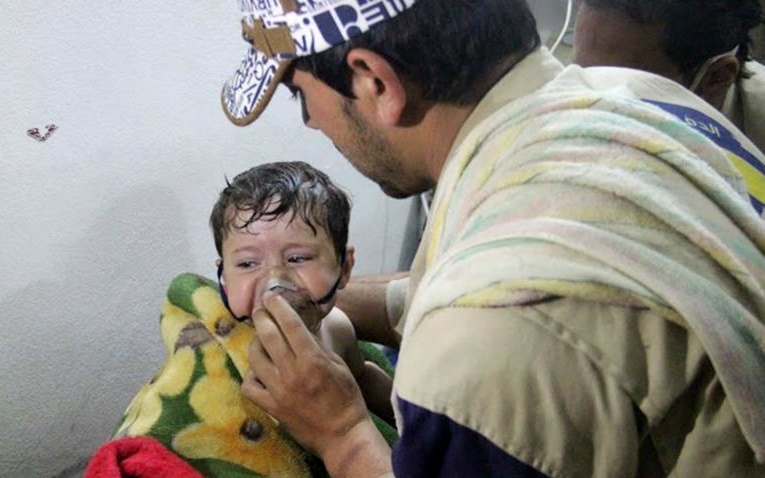A White Helmet volunteer treats a young victim of a pro-Assad attack on Latamineh, Syria, March 2018
The UN has reaffirmed that the Assad regime carried out sarin and chlorine attacks against a town in northwest Syria in March 2017.
The Security Council was briefed on Wednesday about last week’s 82-page report by the Organization for the Prohibition of Chemical Weapons.
The findings, the first by the OPCW’s Investigations and Identification Team, concluded that the regime’s commanders carried out two sarin and one chlorine attacks on Lataminah in northern Hama Province on 24, 25, and 30 March.
The attacks came days before the regime used sarin on Khan Sheikhoun in neighboring southern Idlib Province, killing about 90 people and wounding hundreds.
“Deeply Distressing”
UN head of disarmament Izumi Nakamitusu told the Security Council that the findings were “deeply distressing”.
UN spokesman Stephane Dujarric said Nakamitsu reiterated Secretary-General Antonio Guterres’ position:
The use of chemical weapons by anyone, anywhere, is intolerable and impunity for their use is equally unacceptable. It is imperative to identify and hold accountable all those who have used chemical weapons.
Russia tried to protect the regime with unsupported criticism of the investigators.
Defying UN and OPCW reports of 34 chemical attacks carried out by the regime, Ambassador Vassily Nebenzia maintained that the regime had destroyed all chemical weapons.
He said the IIT was“echoing baseless accusations” by some unnamed countries in findings “without even the slightest traces of due diligence”.
At the OPCW in The Netherlands, Syria’s permanent representative Bassam Sabbagh repeated the regime’s line that the report is “a translation of the wishes of the US and its western allies to target Syria”.
See also Syria Daily: Assad Regime Dismisses OPCW Blame Over 2017 Chemical Attacks
“Heinous Crimes”
But other Security Council members stood firmly behind the OPCW and IIT.
Germany’s Deputy Ambassador Jurgen Schulz summarized:
Accountability is essential and impunity for these heinous crimes is not an option….
Now is definitely not the time to repeat old and invent new, unsubstantiated claims to undermine the OPCW’s legitimacy…[or] the professionalism, objectivity, impartiality and independence [of its experts].
Estonia’s Ambassador Sven Jürgenson emphasized, “Without accountability, the atrocities will continue, if not by the Syrian regime, then by others emboldened by the ability to use these horrendous weapons to hold onto power.”
He called for “the Security Council to act decisively and in a united manner” over the report.
Britain’s Deputy Ambassador Jonathan Allen noted the Russian statement “but the problem is, one cannot just assert what one wants to be true in the face of evidence, which may well be inconvenient evidence to the contrary”.
After the OPCW’s Joint Investigation Mechanism concluded in October 2017 that the Assad regime carried out the Khan Sheikhoun sarin attack, Russia used its Security Council veto to block the extension of the JIM’s mandate.
Moscow was unable to prevent OPCW member-states from creating the IIT in June 2018. So Russia, the Assad regime, and their supporters have vilified the OPCW with almost two years of denunciations. They include a sustained attempt to deny a chlorine attack on Douma, near the Syrian capital Damascus, which killed 43 people in April 2018.
See also The UK Academics Helping Russia Deny Assad’s War Crimes
Solving a Mystery: The Deadly Chemical Attack on Syria’s Douma and a New Document
Douma, the final opposition position in the East Ghouta region, surrendered the next day. Lataminah and Khan Sheikhoun have been overrun by a 10-month Russian-regime offensive in northwest Syria.

